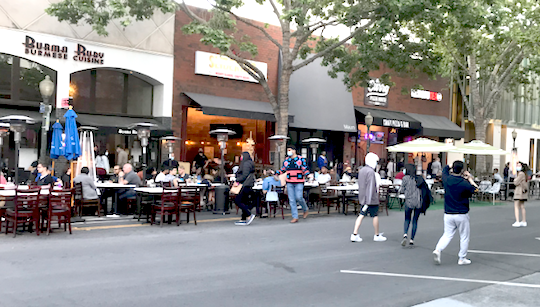
BY BRADEN CARTWRIGHT
Daily Post Staff Writer
The city of Palo Alto may keep University and California avenues closed for longer and allow restaurants to make their outdoor dining setups permanent.
City council will consider a range of street closure alternatives at its meeting on Monday (Sept. 13). Council members will also discuss permitting restaurants to keep dining areas in the parking spaces outside the restaurant, called parklets.
In June, council members voted 4-3 to allow temporary parklets until the end of the year. Next week, they may decide whether to allow them temporarily until June 2022, and permanently after that. Council also voted unanimously then to extend the street closures until Sept. 30.
Now, City Manager Ed Shikada is presenting the council with five options:
• Allow the closures to end at the end of the month.
• Extend the closures until Nov. 1 or Nov. 22, allowing restaurants to benefit from the last days of autumn sun and retailers to benefit from car traffic during the Christmas shopping season.
• Authorize the closures until Jan. 31, allowing flexibility with opening and closing the streets as Covid surges arise.
• Open the streets to traffic on weekdays, and close them on weekends. This would cost between $27,000 and $37,000 each month to take down the traffic barriers. Downtown businesses using the closed streets could pay a fee between $675 and $925 per month for the labor, Shikada said.
• Let Shikada decide when to open the street for the winter, based on the weather.
Survey
In a survey of 65 businesses, respondents were split over whether they support the street closures. The council has received at least 164 emails requesting the closures continue, Shikada said, although those came from both residents and businesses. More restaurant owners support the closures because they say the use of street space allows for social distancing and outdoor dining. Retail stores, on the other hand, say the lack of car traffic is hurting them because visibility and nearby parking is critical, Shikada said.
University Avenue has seen a number of businesses close for good during the pandemic, leaving behind vacant storefronts.
“Palo Alto is dinking around with parklets and walking streets and free public parking while failing to recognize that large swaths of retail are simply gone,” developer John McNellis said in an Aug. 16 Guest Opinion piece in the Post. “Pre-pandemic, the (University) Avenue was fully leased to hip chains and well-established local tenants. Today, its retail vacancy is staggering, at an all-time high. Today, the stagnant street is attracting ever more homeless and its better retailers are hiring top-end security firms to protect themselves from the proliferating ‘grab-and-go’ robberies.”
Parklets create similar issues. Landlord Roxy Rapp told the council that the outdoor expansion of restaurants has hurt other types of businesses in the same vicinity because drivers passing by do not see them. She said she talked to eight retail stores on University Avenue, and all reported sales were down.
Fees for parklets
Temporary parklets are free for businesses, but permanent parklets would likely come with permit fees.
Planners will come up with an ordinance and permit costs for parklets this winter, and the Architectural Review Board will create guidelines for their design. The council would review the ordinance in June 2022, when the temporary parklet program is set to expire.
The discussion comes as the city seeks a consultant to create a new design for University Avenue with more pedestrians and bicycles.
